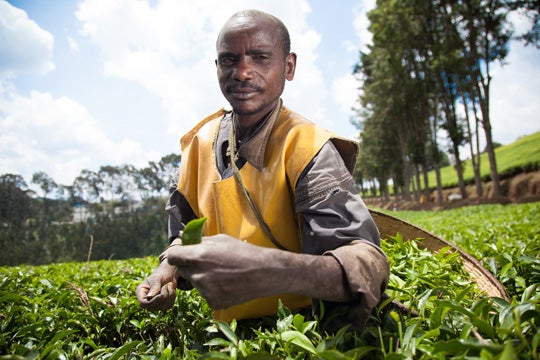
Agricultural transformation is a priority for Africa. Across the continent, the significant information needs of farmers—accurate local weather forecasts, relevant advice on agricultural practices and input use, real time price information and market logistics—remain largely unmet. To the extent that rural regions are typically sparsely populated with limited infrastructure and dispersed markets, the use of innovative information and communication technologies (ICTs) overcome some of these information asymmetries and connect farmers to opportunities that weren't necessarily available to them earlier. Harnessing the rapid growth of digital technologies holds hope for transformative agricultural development.
For example in Ghana, the national e-extension system being developed by the World Bank in collaboration with the Ministry of Agriculture and local Ghanaian technology firm Prep-eez is the first of its kind in West Africa to enhance advisory services, technology transfer, and market price information for farmers throughout the country through voice and data services. The program provides smart phone enabled extension officers in the field with direct access to farmers on standard mobile phones to provide comprehensive agronomic advice and market services via multilingual voice, text, videos and spatial maps. This in turn is enabling greater market participation and technology adoption, building win-win financially sustainable business models using public-private partnership arrangements with national mobile operators AirTel and MTN for long-term impact.
In Nigeria, the government, in partnership with local mobile provider Cellulant Ltd, is using mobile phones to transform the distribution of seeds and fertilizers in remote areas through e-vouchers, reducing inefficiencies. Phones are also being used to disseminate knowledge. Similar models are being implemented to target farmers in Burkina Faso, Cote d’Ivoire, Liberia and Senegal.
Rwanda’s agriculture and livestock markets are being facilitated using the communications platform e-Soko through low cost digital tools and services linking farmers to wholesale markets and agribusinesses. In Uganda, the use of mobile phones has been proven to improve the reach and quality of agricultural extension services in partnership with the Grameen foundation. In addition, a mobile enabled citizen feedback platform is being leveraged to visualize the spread of infections, confirming epidemiology hot spots and disseminating disease treatment and control options to farmers.
Massive growth of ICT innovations in agriculture raises a crucial question as to why some of these innovations fail to scale up and achieve wider acceptance. One reason could be market fragmentation - by crop type, providers, platforms, operating systems and frequency of information that is typical of less mature markets; and as the consolidation of the market place occurs over time, it is likely that growth prospects will be enhanced. Another reason has to do with lack of financially sustainable business models. The private sector needs to be engaged more comprehensively in overcoming the challenges of being able to identify and foster innovation that has the kind of transformative impact that farmers seek.
Going forward, we can and should be very excited about these technologies because of the potential to provide services that weren't necessarily available to rural populations earlier, but there are a few lessons that we also need to focus on.
First, while ICT-led market information systems have had a positive effect on market efficiency and welfare, this evidence is still limited to certain countries and in certain contexts. Whether these effects are going to be a general trend or translate forward into larger aggregate gains still remains to be seen. We cannot take for granted the view that an ICT approach is necessarily going to be a better approach in gaining better outcomes or a more cost effective ways of doing things, and we need to continue to build the evidence around what works, what doesn’t, why and, more importantly, how some of these interventions can be improved.
Second, ICT enabled interventions are no panacea, and need to be backed by complementary investments in rural roads, electricity, literacy and so on. And lastly, IT policy and the broader regulatory environment have to be discussed jointly with the policy dialogue geared toward solutions. If we want to go beyond the hype and build scalable and sustainable business models, these lessons will increasingly hold true for emerging Africa and hopefully beyond.


Join the Conversation